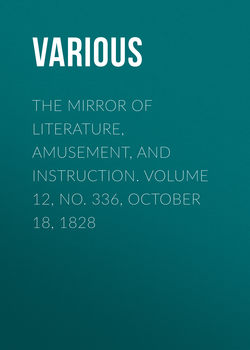The Mirror of Literature, Amusement, and Instruction. Volume 12, No. 336, October 18, 1828

Реклама. ООО «ЛитРес», ИНН: 7719571260.
Оглавление
Various. The Mirror of Literature, Amusement, and Instruction. Volume 12, No. 336, October 18, 1828
Richmond Palace
THE ANECDOTE GALLERY
Pagoda in Kew Gardens
FINE ARTS
RETROSPECTIVE GLEANINGS
SPIRIT OF THE PUBLIC JOURNALS
NOTES OF A READER
THE GATHERER
Отрывок из книги
[The Foreign Quarterly Review gives the following sketch as a "pendant to Mr. Pouqueville's picture of the poet, given in a preceding page," and requoted by us in the last No. of the MIRROR. It is from a History of Greece, by Rizo, a Wallachian sentimentalist of the first order, and in enthusiasm and exuberance of style, it will perhaps compare with any previous sketches of the late Lord Byron: but the romantic interest which Rizo has thrown about these "more last words" will doubtless render them acceptable to our readers.]
For several years a man, a poet, excited the admiration of civilized people. His sublime genius towered above the atmosphere, and penetrated, with a searching look, even into the deepest abysses of the human heart. Envy, which could not reach the poet, attacked the man, and wounded him cruelly; but, too great to defend, and too generous to revenge himself, he only sought for elevated impressions, and "vivoit de grand sensations," (which we cannot translate), capable of the most noble devotedness, and, persuaded that excellence is comprised in justice, he embraced the cause of the Greeks. Still young, Byron had traversed Greece, properly so called, and described the moral picture of its inhabitants. He quitted these countries, pitying in his verses the misery of the Greeks, blaming their lethargy, and despising their stupid submission; so difficult is it to know a nation by a rapid glance. What was the astonishment of the poet, when some years later he saw these people, whom he had thought unworthy to bear the name of Greeks, rise up with simultaneous eagerness, and declare, in the face of the world, that "they would
.....
For several years a man, a poet, excited the admiration of civilized people. His sublime genius towered above the atmosphere, and penetrated, with a searching look, even into the deepest abysses of the human heart. Envy, which could not reach the poet, attacked the man, and wounded him cruelly; but, too great to defend, and too generous to revenge himself, he only sought for elevated impressions, and "vivoit de grand sensations," (which we cannot translate), capable of the most noble devotedness, and, persuaded that excellence is comprised in justice, he embraced the cause of the Greeks. Still young, Byron had traversed Greece, properly so called, and described the moral picture of its inhabitants. He quitted these countries, pitying in his verses the misery of the Greeks, blaming their lethargy, and despising their stupid submission; so difficult is it to know a nation by a rapid glance. What was the astonishment of the poet, when some years later he saw these people, whom he had thought unworthy to bear the name of Greeks, rise up with simultaneous eagerness, and declare, in the face of the world, that "they would
Безопасно оплатить книгу можно банковской картой Visa, MasterCard, Maestro, со счета мобильного телефона, с платежного терминала, в салоне МТС или Связной, через PayPal, WebMoney, Яндекс.Деньги, QIWI Кошелек, бонусными картами или другим удобным Вам способом.
.....